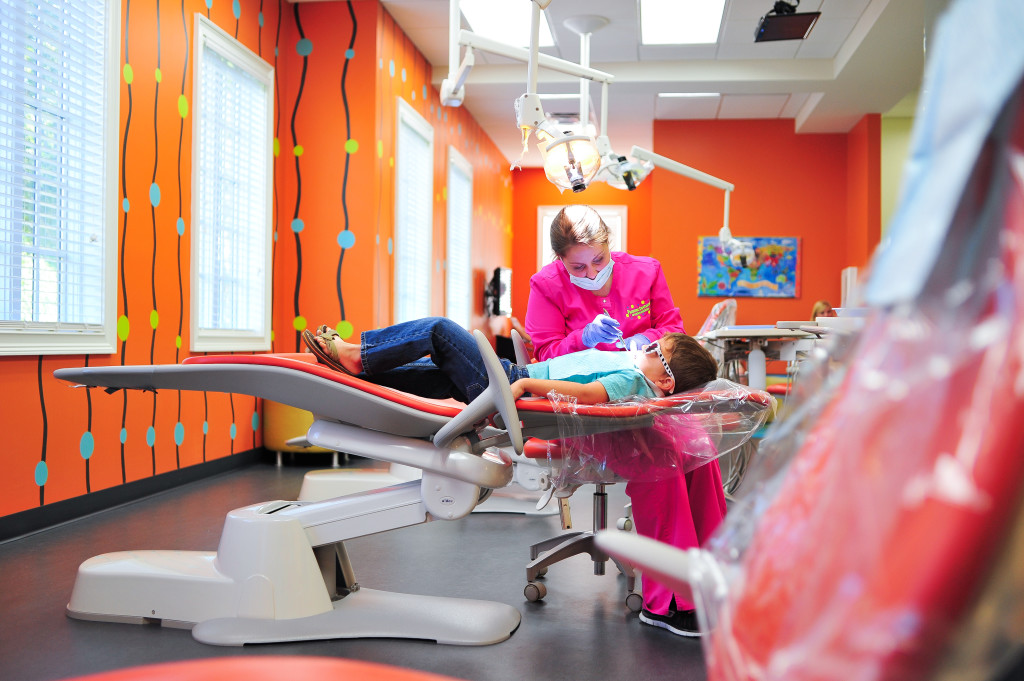Kids are different. Unlike adult patients, they aren’t always able to fully express and manage their feelings of fear or anxiety. The best pediatric dentists know that children need a gentle dentist. That’s why we’ve designed our practice around their needs.
Our Services

Sedation and Comfort
Gentle Dental Care for Children
Sedation dentistry is most helpful for children who:
• Require major treatment
• Are very anxious;
• Have had traumatic dental experiences
• Have a strong gag reflex;
• Have special needs, including sensory integration imbalances
• Have developmental or health issues that prevent them from remaining still.
As pediatric dentists, our doctors have extensive practical experience working with anxious children and can recommend any number of safe and effective medications that can help relax your child for optimal dental treatment.
Nitrous Oxide
Nitrous oxide, or “laughing gas,” is given along with oxygen through a small breathing mask placed over the child’s nose. This mild gas allows them to relax without putting them to sleep. The American Academy of Pediatric Dentistry recognizes this as a very safe, effective technique. The gas is fast acting and, with normal breathing, is quickly eliminated from the body.
Conscious Sedation
There are a variety of medications in liquid and pill form that can be used to help your child relax. These will make your child be quite drowsy. Your child may even fall asleep but will not become unconscious. Conscious sedation is typically recommended for apprehensive children, very young children and children with special needs.
General Anesthesia
Children with more complex needs as well as children undergoing extensive treatment certainly benefit from a gentle dentist. Here, Dr. Moore may suggest traditional, general anesthesia. This is typically performed in an outpatient hospital setting under the care of a certified anesthesiologist.
During your child’s examination, Dr. Moore will discuss the appropriate options so that your child is most comfortable during dental treatment.
Emergency Care
Emergency? Here's What You Do!
If your child’s emergency only involves their teeth: Call our office at (478) 333-3636. If your child has also injured their head (hit their head): please go to the closest emergency room for immediate evaluation. After evaluating for a concussion or other head-related injury, call our office so we can arrange a time to evaluate their teeth.
What Are Common Causes Of Dental Pain?
Common causes of dental pain include tooth fractures, tooth decay, impacted food and tooth eruption (especially baby molars and wisdom teeth). The symptoms of these different conditions are quite similar… the area hurts! The first step is to contact your Pediatric Dentist for advice. Prior to the evaluation, a cold compress may reduce swelling. Never apply any medication to the affected gum area or tooth. (Doing so can worsen many conditions.)
What Is An Easy Way To Remedy Small Cuts To The Lips Or Tongue?
Popsicles! Children frequently fall and do no harm other than biting their lip, tongue or sustaining a small cut. Light, constant pressure stops bleeding. One of the easiest way to apply cold to prevent swelling is by offering a popsicle!
What Do I Do If My Child Knocks Out A Baby Tooth?
A common dental emergency is an accident that knocks out a front tooth. Knowing in advance what to do and not to do, can gain a more favorable outcome. Treatment of a baby tooth that has been knocked out is typically different than treatment of a permanent tooth. If a baby tooth is knocked out, re-implantation (putting the tooth back in) is rarely advised. Attempting to place a baby tooth back in the socket can damage the developing tooth bud of the permanent tooth. If your child’s baby tooth is knocked-out, call your Pediatric Dentist’s office immediately for a same-day appointment so the Dentist may evaluate the area, surrounding bone and teeth. If you have the tooth, bring it with you.
What Do I Do If My Child Knocks Out A Permanent Tooth?
If a permanent tooth is knocked out, your Pediatric Dentist wants to see the patient, if possible,within an hour of the accident and attempt re-implantation. Time is critical to save the tooth.
Here is what you do:
• Find the tooth, if you can. Pick it up ONLY by the crown (not the root).
• Do not scrub or scrape the tooth.
• If possible, re-implant the tooth.
• If you cannot re-implant the tooth, keep the tooth moist. Either coat the tooth in milk or saliva (your child’s saliva or your own if the tooth would be a choking hazard for your child). If the tooth dries out, the chances of a successful re-implantation are less.
•Call your Pediatric Dental Office to let them know you are on your way. If the office is closed, head to the closest emergency room.
What Do I Do If My Child Falls And The Teeth Are Moved Out Of Place?
Other common dental injuries requiring immediate evaluation include “dental intrusion” and “dental displacement”. These are terms that describe conditions, after an accident, where the teeth are pushed up into the bone or pushed out of place. Both conditions are extremely painful. In these circumstances, call your Pediatric Dental office immediately. If the office is not open, visit your nearest emergency room. Prior to transporting the child, offer Tylenol. Applying an ice pack (buffered by a towel) can help reduce swelling. A bag of frozen vegetables can act as a handy ice pack and easily conform to your child’s face.
What Else Is Good To Know?
Every childhood includes some events that bump, scratch, fall, bruise and even break. It’s part of raising an active, healthy and adventurous youth! Fortunately, the skill and experience of the dental professionals with Pediatric Dentistry of Central Georgia can put back together anything your child might un-do. After all, we “Grow Big Smiles”! Just keep our phone number close (478) 333-3636 and enjoy watching your little one grow.